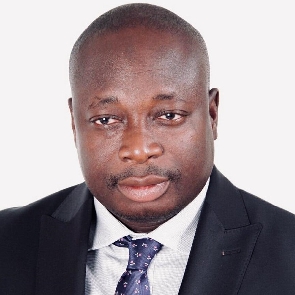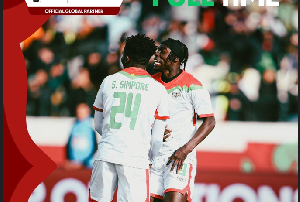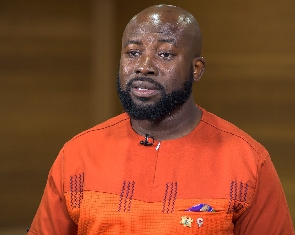For a time, in the aftermath of the global pandemic of COVID-19 and coupled with the Russia-Ukraine war, the world faced possibly the worst economic outlook for a generation. However, their effect on the Ghanaian economy is so pervasive, contrary to the evidence in the context of African nations and other developing economies around the world.
The Ghana experience can only be attributable to one thing. Super incompetent management of the economy with motive of corruption.
The most important principle of good government in the 21st century is that business and government must play separate roles. The government must not try to interfere in the day-to-day running of any business, including financial institutions, as President Akufo-Addo and his government have compromised the independence of the Bank of Ghana and the entire financial sector.
The entire Economic Management Team, led by Vice President Mahamudu Bawumia, has mortgaged the economic health of our country to a negative economy, which cannot be compared to any underperforming economy within the ECOWAS nations over the past few decades. Inflation was almost over 42 percent in the 2nd quarter of the year, with very high interest rates, to say the least.
Since 2017, not a single budget has been adopted in a realistic form and implemented. Artificial exchange rate regime leading to insider trading and the recent Government-pervasive barter practices like oil for gold, which might be part of the reasons for the current economic challenges of Kwame Nkrumah’s Ghana.
The unveiling of the mid-year budget review is imminent, and even though it is an annual ritual, this year’s edition is of particular interest to Ghanaians. This is because the impending review is the first budget document that will be released to the public that takes into full consideration the demands of the International Monetary Fund on expenditure and revenue patterns.
Indeed, putting the document together has required veritable juggling of some very disparate interests and convictions with regards to the way forward for managing the national economy through its gravest macro-economic challenges. As one Ministry of Finance staffer admits: “Producing a revised budget acceptable to all the various key stakeholder institutions has proved to be very tricky”.
There are several reasons for this.
Firstly, the return of the IMF marks a full return to demand management as the underlying philosophy behind macroeconomic policy, after six years of supply-side economics, has ultimately run aground, assisted in this by both COVID-19 and the outbreak of war between Russia and Ukraine.
To be sure, it is the IMF’s unwavering belief in demand management that persuaded the President Nana Akufo-Addo Administration to keep its distance from the fund until it completely ran out of other policy options by the beginning of 2022. Simply put, the incumbent government believes in expansionary economic policy to maximise economic growth as quickly as possible, while the IMF believes in demand management to ensure economic stability first so that when growth eventually comes, it is sustainable.
Another ground for contention has been the IMF’s insistence that the government needs to reduce its size and consequent spending in tandem with substantial increases in public revenues from taxes. The government, for its own part, has resisted strong calls from the populace for downsizing, relying instead almost entirely on revenue enhancement measures and the accumulation of payment arrears.
In the planning for the budget review, the government has made an argument to support its stance that debt restructuring will provide the fiscal space to support the financing of running government in its current form.
Indeed, the domestic debt exchange programme (DDEP) was originally aimed at cutting the government’s debt servicing obligations by some GH¢62billion for 2023, although the actual outcome is smaller because of the concessions the government was forced into by some segments of domestic bond holders.
The negotiations for restructuring the foreign debt are still ongoing, and the outcome will be crucial since it involves debt that carries foreign exchange obligations in its entirety. In accordance with best practice, however, the IMF is insisting that the eggs should not be counted before they are laid.
Although the government agrees with this practice, it did not factor the savings to be made in the DDEP into its 2023 Budget because at the time it was prepared and delivered, even though those savings had been identified and the process of actualising them had started, the savings had not actually been made. It has still tried to use the incoming new savings on the external debt to justify retaining the government’s inordinate size and cost.
Additionally, the government has offered further divestitures of underperforming productive assets owned by the state as an added incentive for the IMF to accede to its size and spending. This, however, may prove trickier than it would seem. With less than a year and a half until a constitutionally imposed change of political administration, accusations of state capture by the current one are bound to arise, and the fiasco that arose out of the initiative to transform the state-owned Electricity Company of Ghana into the partly privately owned and managed Power Distribution Services gives some credence to those fears.
Here again, the IMF is reluctant to add these to the 2023 revenue projections, especially since the year is already running toward its end. Besides, it calculates that even if all the expected savings and state sales of assets were to come through, they would be better spent accelerating the pace of fiscal consolidation than providing food to support the government’s fat.
Another bone of contention ahead of the impending mid-year review has been taxes. The IMF is established to achieve certain key macro-economic targets necessary for achieving and sustaining economic stability on which sustainable economic growth can occur, and one of them is the tax revenue to gross domestic product ratio, which effectively measures the capacity of a country to finance its running from its own resources rather than borrowing, grants, asset sales, and the like.
Ghana has always lagged far behind its peers in this regard, and even the recent rash of new taxes and increases of old ones have left the country with a ratio of less than 18 percent.
While this is an improvement on the 16 percent at the start of the decade, it still falls far short of the 25 percent average for lower middle-income countries globally, which are Ghana’s peers. The IMF, therefore, insists on more tax revenues; and meeting its key targets matters more to the fund than the impacts of the requisite tax increases on the populace.
Finance Minister Ken Ofori-Atta announced a target of achieving 20 percent by the middle of the decade, but political considerations are making this difficult despite the strong promptings of the fund. The government has put in place the platform upon which the vast informal sector, which accounts for three quarters of the economy, can finally be taxed on their income as well as their consumption, with the digitalisation of the country and the issuance of the Ghana Card.
However, as with previous administrations, there is a lack of political will because the informal sector also makes up most of the electorate. As the next general elections draw ever closer, politics will dampen even more.
The IMF, though, has no such compunctions, and the compromise will most likely be increased consumption taxes.
In view of the aforementioned, I cannot ask questions about the efficiency of the World Bank and IMF’s financial assistance to Ghana. I also strongly believed that the IMF money injection in May 2023 might be detrimental to the interests of Ghanaian taxpayers.
Opinions of Monday, 24 July 2023
Columnist: Osman Kitoe Sulemana















